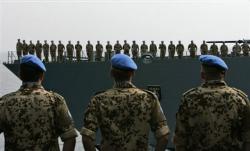When thinking about peacekeeping, blue-helmeted soldiers come to mind. With 82,000 peacekeepers deployed on sixteen active UN peacekeeping operations around the world, that’s not surprising. Recent piracy activity in the Gulf of Aden, though, suggests that peacekeeping needs to encompass the maritime domain as well.
In an earlier New Atlanticist post, “The Challenge of Somali Piracy,” J. Peter Pham outlined the problem:
From an occasional nuisance just a few years ago, Somali piracy has burgeoned into an international problem affecting literally dozens of countries around the globe. Hijacked vessels currently being held in Somali ports include ships flying the flags of China, Egypt, Iran, Japan, Malaysia, Nigeria, Panama, South Korea, and Thailand. Captured seamen presently being held for ransom by the pirates come from fifteen countries, including Croatia, India, Italy, Pakistan, the Philippines, and Russia. Insurance premiums for commercial shipping which must pass through the Gulf of Aden, through which waters some 11 percent of world’s seaborne petroleum must transit, have soared tenfold over the course of the past year, adding yet another drag to the sluggish global economy.
In addition to blue helmets monitoring, separating, or facilitating peace processes on land, we should also have gray hulls monitoring and interdicting threats to peace on the oceans.
However, the energizer bunny-nature of UN peacekeeping operations needs to be transformed to ensure these operations can successfully conclude. Bangladeshi, Pakistani, and Indian ground forces have, for generations, contributed the bulk of forces for UN peacekeeping operations, and their willingness to stay for long periods has made it possible to sustain missions almost indefinitely. The same is unlikely to hold true for maritime forces. Decreases in defense budgets have hit navies hard and there are very few countries in the world that can deploy ships to patrol waters far away from their homes.
Yet, the seizure of the Ukrainian-owned, Belizean-registered freighter Faina, which carries $30 million worth of weapons, is the impetus for the Atlantic community to react through naval peacekeeping operations. France has been pushing for an anti-piracy force for several years and unveiled an anti-piracy plan this week that would involve at least nine EU countries, which could begin operations in November. There seems to be broad consensus that Europe must take action.
British Defense Minister Des Browne has said that as the world’s biggest trading grouping, protecting the EU’s security and way of life depended on being able to secure global trade routes. “It’s not just inside the EU or on the borders of the European Union, it’s off the coast of Somalia and Kenya, it’s more broadly, it’s ensuring that oil that travels around this world travels around it securely.”
There is clearly political support for such a move, but is there the political will in Europe to take decisive action? If other European operations are the guide, then sadly, the answer is no. In Afghanistan, European governments have reluctantly deployed force and then limited how their military forces can be used. Somali pirates may be learning the lesson that they can just wait out the latest European proposal.
Allowing this to happen would be a mistake.
Now that Somali pirates have captured global attention and European navies seem prepared to deploy to the Horn of Africa, working through the rules of engagement is critical. How aggressive will naval action be against pirates? Will European frigates attack the pirates when these same countries have largely refused to conduct combat operations against Taliban in Afghanistan? And what happens if there is little pirate activity to meet this fleet of warships? Will these Sailors go ashore and strike the pirate’s camps in Somalia? Or, how willing are European countries willing to support peacekeepers in Somalia or will they continue to let ill-equipped blue helmets with a limited mandate attempt to bring stability to Somalia.
These are not trivial questions as international acquiescence has largely supported these pirate groups by paying ransoms. As Europe attempts to restore good at order at sea, policymakers need to understand that the problem of piracy begins ashore and that offensive military action may be required.
Derek S. Reveron is a professor of national security affairs at the US Naval War College.
Image: blue-helmets-gray-hulls-original.warsawbiopic.jpg
